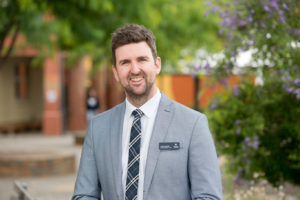Google is not enough

Dear Families and Friends
There are loud voices in Australian education calling for revolution. The message goes something like this: with the introduction of the internet, access to information has never been easier. Thus, we no longer need experts in subjects; instead, we need experts in thinking. Apparently, because modern day students have access to Google, schools should spend more time focusing on teaching young people how to use 21st century skills, such as “critical and creative thinking”, to discuss, critique, debate and respond to what they find. Put simply, the people calling for educational revolution are claiming schools should spend less time teaching subject content and more time teaching thinking skills. At Emmaus we believe humans are image-bearers of a creative God, consequently, we believe humans are also inherently creative. Our teaching staff want to empower and encourage critical and creative thinking in all subjects.
Yet, unlike our omniscient God, the human mind has significant limitations. When explaining how our human mind processes and then learns new information, scientists often highlight two areas of our cognitive architecture: working memory and long-term memory. Our working memory, which is the area where we do all our conscious thinking, has the ability to hold new information while simultaneously processing other information. However, there are significant limitations with our working memory. Generally, humans can only hold between four to seven individual items in our working memories at one time. Furthermore, the duration of how long we can hold onto these items is limited, with new, unprocessed information being forgotten only after a few seconds. This is why if you are anything like me, when you hear a new 10-digit phone number you need to write it down quickly for any chance of being able to use it later. Whereas, in contrast, when humans are required to think about, or process information already stored in our long-term memory, our limitations are significantly reduced. When a 10-digit number is stored in long-term memory, we can effortlessly recall the memorised number.
A study on chess grandmasters illustrates the important difference between working memory and long-term memory. Researchers showed groups of grandmasters and casual players a series of legal chess configurations for five seconds. They then asked each group of players to recall the exact positions of the chess pieces. The grandmasters appeared to have a vastly superior recall ability. Initially, it was thought that chess grandmasters gained their expertise from having a superhuman ability to remember things quickly. However, another group of researchers replicated the study, but this time they spread the chess pieces across the board at random not following the rules of the game. This disorientated the grandmasters and they subsequently lost their edge. This highlighted that grandmasters actually have the same limitations of working memory as the mere casual player. This famous study found that grandmasters were not expert problem solvers or strategists, rather what made the difference was these masters had memorised thousands of board configurations and possible subsequent moves into their long-term memory, which could be quickly recalled. The findings of this study have been replicated many times in fields outside of chess.
How does this relate to thinking and learning? Novices rely on thinking skills while experts use their vast knowledge stored in their long-term memory. The more subject knowledge we have in long-term memory, the more we can actually use critical and creative thinking skills. If humans have to rely on using problem-solving skills without being able to draw upon memorised and relevant knowledge, they are at a significant disadvantage. Our maths teachers see this being played out every day when students are learning increasingly complex mathematical concepts.
When faced with a problem requiring simple multiplication or division, such as manipulating fractions, students who do not have the relevant times tables memorised are constantly disadvantaged. They have to consciously solve the multiplication fact in their working memory while simultaneously trying to hold the correct procedure for solving the fractions problem. ‘Silly’ mistakes are likely caused because their working memory has become so overwhelmed that necessary items are dropped to reduce cognitive load. In contrast, students who have relevant multiplication facts memorised can quickly recall these with no strain on their limited working memory. Thus, they can focus all conscious thought on the fraction problem at hand.
Unfortunately, the human brain does not work as conveniently as the educational revolutionaries would have us believe. We cannot simply tap into the internet, quickly download information like Neo did in The Matrix and then use our “thinking skills” to become overnight experts. The hard truth is that learning takes time, and to have any thoughts of value, let alone originality, people usually need to know a large amount of relevant content knowledge first. Consequently, at Emmaus we have not sacrificed the teaching of content knowledge to excessively emphasise thinking skills. We believe the internet is an immeasurably useful tool for teaching and learning. However, because of our limited working memory, students still need the time to patiently learn a vast amount of subject knowledge throughout their time at school. This is actually our quickest and most likely path to empowering our students to become life-long thinkers and learners.
Adrian Cotterell
Director of Studies ELC-12
